北师版(2019)选择性必修4 Unit10 Conflict And Compromise Viewing workshop课件(共22张PPT,内镶嵌视频)
文档属性
| 名称 | 北师版(2019)选择性必修4 Unit10 Conflict And Compromise Viewing workshop课件(共22张PPT,内镶嵌视频) | 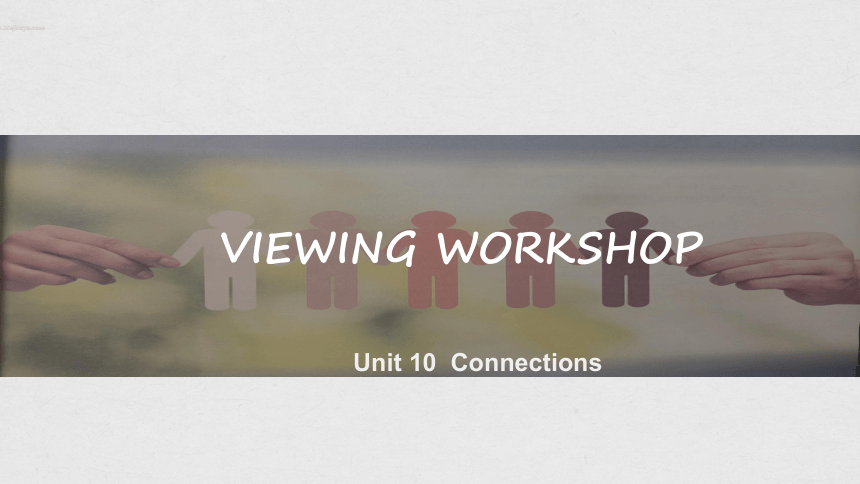 | |
| 格式 | pptx | ||
| 文件大小 | 113.9MB | ||
| 资源类型 | 教案 | ||
| 版本资源 | 北师大版(2019) | ||
| 科目 | 英语 | ||
| 更新时间 | 2024-04-27 18:19:11 | ||
图片预览

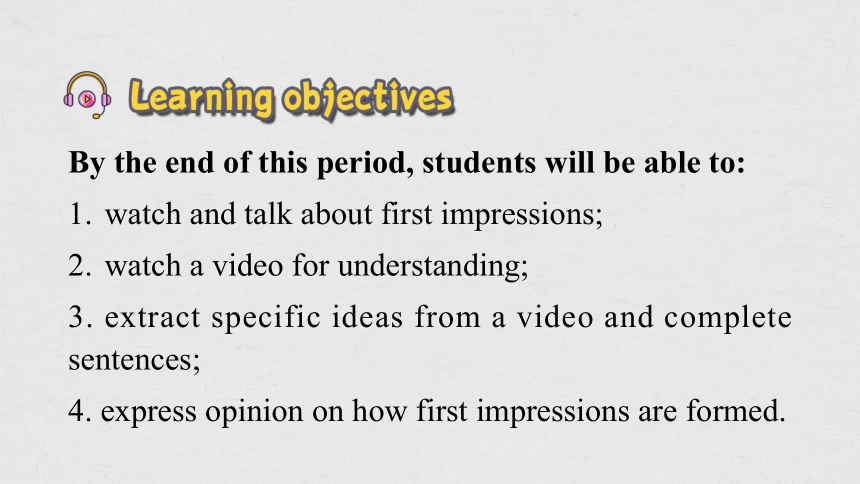
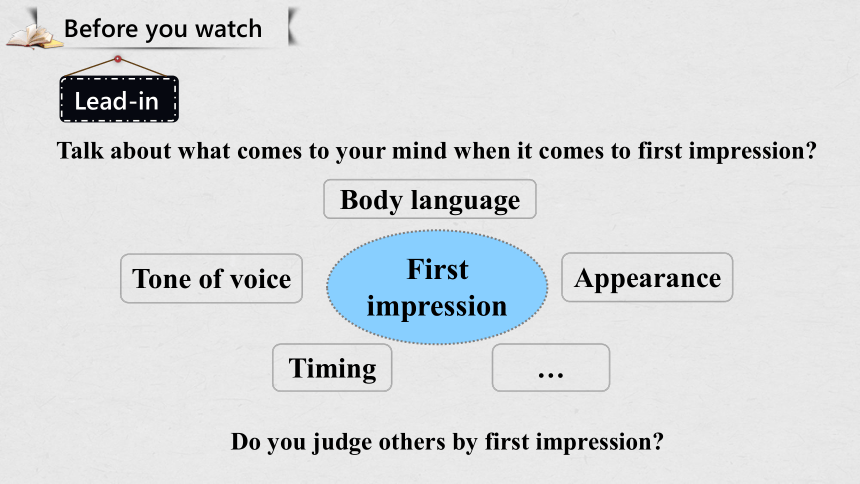
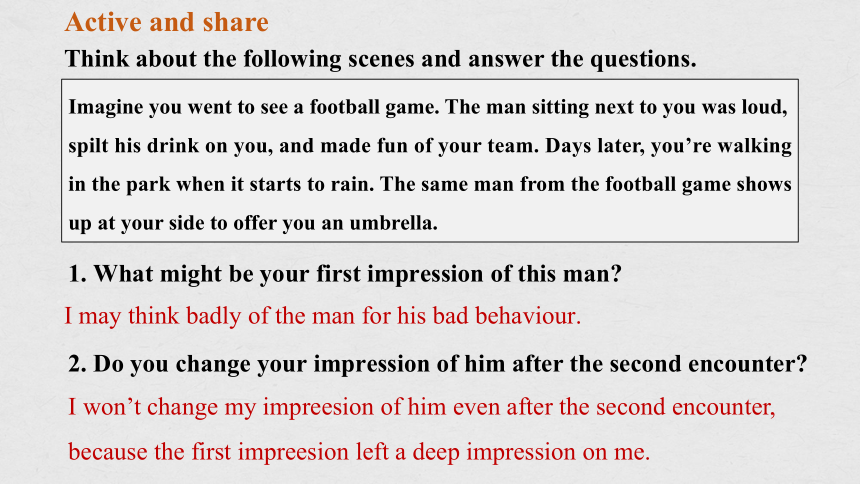
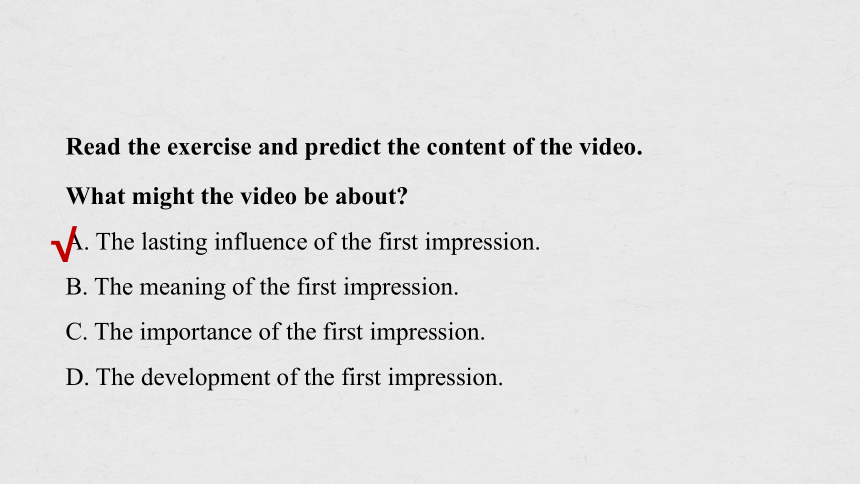
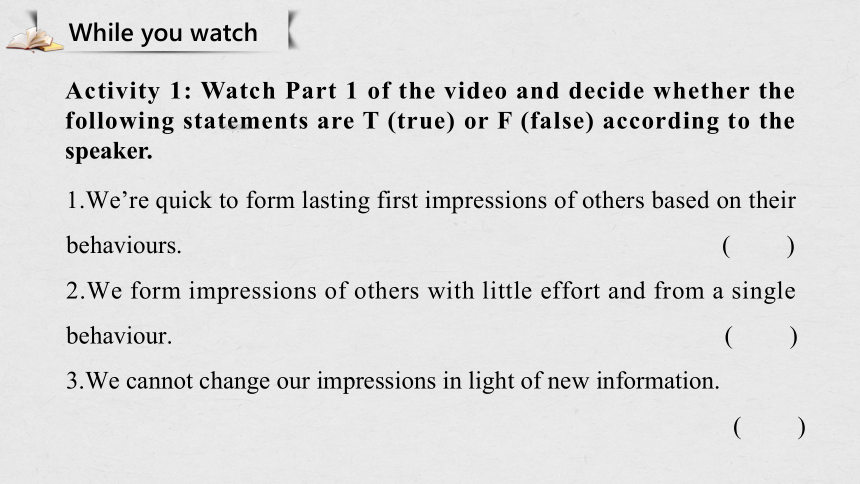
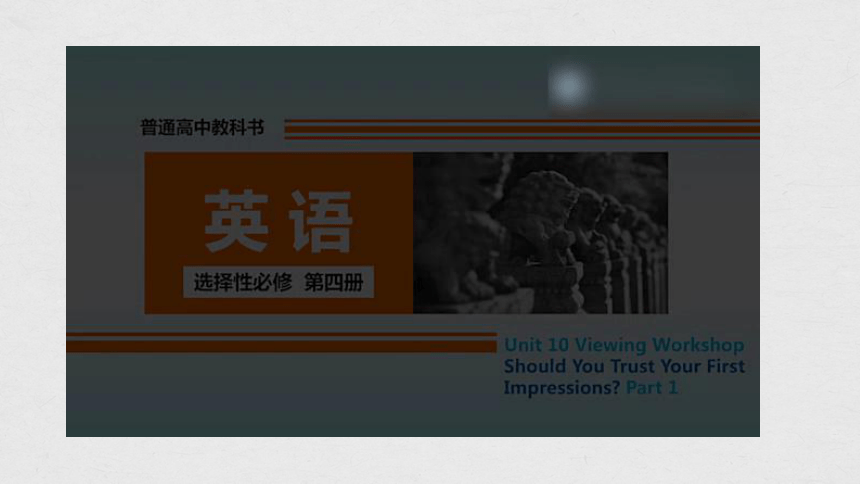
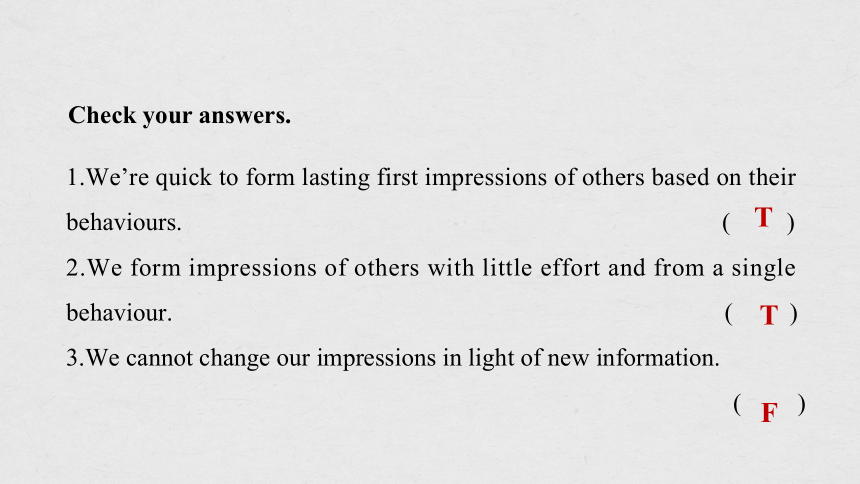
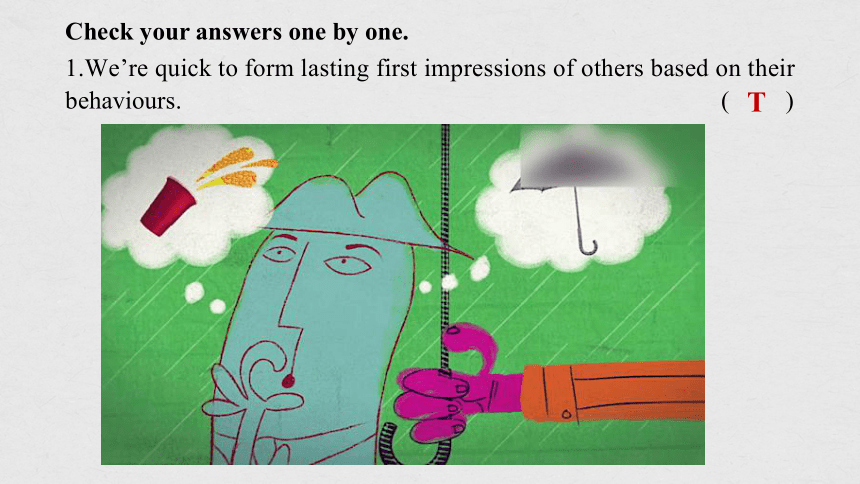
文档简介
(共22张PPT)
Unit 10 Connections
VIEWING WORKSHOP
By the end of this period, students will be able to:
watch and talk about first impressions;
watch a video for understanding;
3. extract specific ideas from a video and complete sentences;
4. express opinion on how first impressions are formed.
Talk about what comes to your mind when it comes to first impression
First impression
Timing
Appearance
Tone of voice
Body language
…
Do you judge others by first impression
Before you watch
Lead-in
1. What might be your first impression of this man
2. Do you change your impression of him after the second encounter
Imagine you went to see a football game. The man sitting next to you was loud, spilt his drink on you, and made fun of your team. Days later, you’re walking in the park when it starts to rain. The same man from the football game shows up at your side to offer you an umbrella.
I may think badly of the man for his bad behaviour.
I won’t change my impreesion of him even after the second encounter,
because the first impreesion left a deep impression on me.
Think about the following scenes and answer the questions.
Active and share
Read the exercise and predict the content of the video.
What might the video be about
A. The lasting influence of the first impression.
B. The meaning of the first impression.
C. The importance of the first impression.
D. The development of the first impression.
√
1.We’re quick to form lasting first impressions of others based on their behaviours. ( )
2.We form impressions of others with little effort and from a single behaviour. ( )
3.We cannot change our impressions in light of new information.
( )
While you watch
Activity 1: Watch Part 1 of the video and decide whether the following statements are T (true) or F (false) according to the speaker.
1.We’re quick to form lasting first impressions of others based on their behaviours. ( )
2.We form impressions of others with little effort and from a single behaviour. ( )
3.We cannot change our impressions in light of new information.
( )
Check your answers.
F
T
T
Check your answers one by one.
1.We’re quick to form lasting first impressions of others based on their behaviours. ( )
T
2.We form impressions of others with little effort and from a single behaviour. ( )
T
3.We cannot change our impressions in light of new information.
( )
F
Very negative, highly immoral information has a ______________ than very positive, highly moral information.
When learning about another person’s abilities and competences, the _______________ gets weighed more heavily.
Highly immoral actions and highly competent actions are _____________ behaviours that people tend to weigh ________________.
The brain decides whether the behaviour is typical or __________________ in order to make complex decisions.
Caring more about the very negative, immoral things is ______________ of the comparative rarity of those bad behaviours. “Bad” might be stronger than “good”, only because “good” is _________________.
Activity 2: Read the following sentences and grasp the key information.
Very negative, highly immoral information has a ______________ than very positive, highly moral information.
When learning about another person’s abilities and competences, the _______________ gets weighed more heavily.
Highly immoral actions and highly competent actions are _____________ behaviours that people tend to weigh ________________.
The brain decides whether the behaviour is typical or __________________ in order to make complex decisions.
Caring more about the very negative, immoral things is ______________ of the comparative rarity of those bad behaviours. “Bad” might be stronger than “good”, only because “good” is _________________.
Activity 3: Watch Part 2 of the video and complete the information.
Check your answers.
Very negative, highly immoral information has a ______________________ than very positive, highly moral information.
When learning about another person’s abilities and competences, the ____________________ gets weighed more heavily.
Highly immoral actions and highly competent actions are _____________ behaviours that people tend to weigh ________________.
The brain decides whether the behaviour is typical or __________________ in order to make complex decisions.
Caring more about the very negative, immoral things is ______________ of the comparative rarity of those bad behaviours. “Bad” might be stronger than “good”, only because “good” is _________________.
out of the ordinary
positive information
less frequent
more heavily
a direct result
more plentiful
stronger impact
Very negative, highly immoral information has a ______________ than very positive, highly moral information.
stronger impact
Check your answers one by one.
2.When learning about another person’s abilities and competences, the _________________ gets weighed more heavily.
positive information
3.Highly immoral actions and highly competent actions are _____________ behaviours that people tend to weigh _____________.
less frequent
more heavily
4.The brain decides whether the behaviour is typical or _____________ in order to make complex decisions.
out of the ordinary
5.Caring more about the very negative, immoral things is ______________ of the comparative rarity of those bad behaviours. “Bad” might be stronger than “good”, only because “good” is _________________.
a direct result
more plentiful
1. Do you think it is important to make a good first impression Why
In my opinion, it is very importnat to make a good first impression, because first impression is of great significance to us nowadays, especially when we are applicants of an interview.
After you watch
Discussion
2. How can we achieve a good impression
To achieve a good first impression, we should give ourself a new look, for example, we’d better dress properly, talk decently, and behave well, thus we will leave a better impression.
Unit 10 Connections
VIEWING WORKSHOP
By the end of this period, students will be able to:
watch and talk about first impressions;
watch a video for understanding;
3. extract specific ideas from a video and complete sentences;
4. express opinion on how first impressions are formed.
Talk about what comes to your mind when it comes to first impression
First impression
Timing
Appearance
Tone of voice
Body language
…
Do you judge others by first impression
Before you watch
Lead-in
1. What might be your first impression of this man
2. Do you change your impression of him after the second encounter
Imagine you went to see a football game. The man sitting next to you was loud, spilt his drink on you, and made fun of your team. Days later, you’re walking in the park when it starts to rain. The same man from the football game shows up at your side to offer you an umbrella.
I may think badly of the man for his bad behaviour.
I won’t change my impreesion of him even after the second encounter,
because the first impreesion left a deep impression on me.
Think about the following scenes and answer the questions.
Active and share
Read the exercise and predict the content of the video.
What might the video be about
A. The lasting influence of the first impression.
B. The meaning of the first impression.
C. The importance of the first impression.
D. The development of the first impression.
√
1.We’re quick to form lasting first impressions of others based on their behaviours. ( )
2.We form impressions of others with little effort and from a single behaviour. ( )
3.We cannot change our impressions in light of new information.
( )
While you watch
Activity 1: Watch Part 1 of the video and decide whether the following statements are T (true) or F (false) according to the speaker.
1.We’re quick to form lasting first impressions of others based on their behaviours. ( )
2.We form impressions of others with little effort and from a single behaviour. ( )
3.We cannot change our impressions in light of new information.
( )
Check your answers.
F
T
T
Check your answers one by one.
1.We’re quick to form lasting first impressions of others based on their behaviours. ( )
T
2.We form impressions of others with little effort and from a single behaviour. ( )
T
3.We cannot change our impressions in light of new information.
( )
F
Very negative, highly immoral information has a ______________ than very positive, highly moral information.
When learning about another person’s abilities and competences, the _______________ gets weighed more heavily.
Highly immoral actions and highly competent actions are _____________ behaviours that people tend to weigh ________________.
The brain decides whether the behaviour is typical or __________________ in order to make complex decisions.
Caring more about the very negative, immoral things is ______________ of the comparative rarity of those bad behaviours. “Bad” might be stronger than “good”, only because “good” is _________________.
Activity 2: Read the following sentences and grasp the key information.
Very negative, highly immoral information has a ______________ than very positive, highly moral information.
When learning about another person’s abilities and competences, the _______________ gets weighed more heavily.
Highly immoral actions and highly competent actions are _____________ behaviours that people tend to weigh ________________.
The brain decides whether the behaviour is typical or __________________ in order to make complex decisions.
Caring more about the very negative, immoral things is ______________ of the comparative rarity of those bad behaviours. “Bad” might be stronger than “good”, only because “good” is _________________.
Activity 3: Watch Part 2 of the video and complete the information.
Check your answers.
Very negative, highly immoral information has a ______________________ than very positive, highly moral information.
When learning about another person’s abilities and competences, the ____________________ gets weighed more heavily.
Highly immoral actions and highly competent actions are _____________ behaviours that people tend to weigh ________________.
The brain decides whether the behaviour is typical or __________________ in order to make complex decisions.
Caring more about the very negative, immoral things is ______________ of the comparative rarity of those bad behaviours. “Bad” might be stronger than “good”, only because “good” is _________________.
out of the ordinary
positive information
less frequent
more heavily
a direct result
more plentiful
stronger impact
Very negative, highly immoral information has a ______________ than very positive, highly moral information.
stronger impact
Check your answers one by one.
2.When learning about another person’s abilities and competences, the _________________ gets weighed more heavily.
positive information
3.Highly immoral actions and highly competent actions are _____________ behaviours that people tend to weigh _____________.
less frequent
more heavily
4.The brain decides whether the behaviour is typical or _____________ in order to make complex decisions.
out of the ordinary
5.Caring more about the very negative, immoral things is ______________ of the comparative rarity of those bad behaviours. “Bad” might be stronger than “good”, only because “good” is _________________.
a direct result
more plentiful
1. Do you think it is important to make a good first impression Why
In my opinion, it is very importnat to make a good first impression, because first impression is of great significance to us nowadays, especially when we are applicants of an interview.
After you watch
Discussion
2. How can we achieve a good impression
To achieve a good first impression, we should give ourself a new look, for example, we’d better dress properly, talk decently, and behave well, thus we will leave a better impression.
同课章节目录
- Unit 10 Connections
- Lesson 1 How Closely Connected Are We?
- Lesson 2 Community Spirit
- Lesson 3 Anne of Green Gables
- Unit 11 Conflict And Compromise
- Lesson 1 Living In a Community
- Lesson 2 Dealing with Conflict
- Lesson 3 War Memories
- Unit 12 Innovation
- Lesson 1 Scientific Breakthroughs
- Lesson 2 Aha Moment
- Lesson 3 Stephen Hawking
